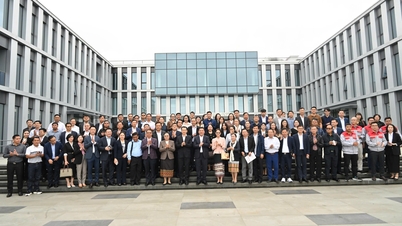
Initial research suggests that if properly harnessed, the "hibernating biological superpower" could open up new treatment directions for metabolic diseases and nerve damage - Photo: AI
In many mammals, hibernation is a special biological state that helps the body slow down its metabolism, conserve energy, and withstand harsh environmental conditions. According to genetics professor Christopher Gregg of the University of Utah, it is the genes that regulate this process that create "a series of biological superpowers" such as resistance to brain damage and selective insulin resistance.
When animals wake up from hibernation, blood rushes to the brain, which would normally cause a stroke in humans. But thanks to a special protective mechanism, their brains are not damaged.
Additionally, some animals like ground squirrels can develop insulin resistance to store fat before hibernation, but then this ability naturally disappears.
Surprisingly, humans also possess similar gene segments, and scientists believe that we can completely exploit these mechanisms for medical purposes.
Breakthrough from lab mice
In a study published in the journal Science on July 31, a research team at the University of Utah (USA) identified key factors located near the FTO gene cluster, which is related to metabolic control, body mass and obesity risk in humans.
While mice don’t hibernate, they can enter a state of “torpor,” a temporary sleepiness when they’re hungry, long enough to study similar genetic mechanisms. Using the gene-editing tool CRISPR, scientists “disabled” five non-coding regulatory DNA sequences (CREs) in mice and observed:
Deletion of a CRE segment named E1 caused female mice to gain significant weight when fed a high-fat diet.
Deletion of the E3 segment changes the way mice forage in experimental environments.
In other words, tweaking just a few small stretches of DNA was enough to alter the behavior, metabolism, and physiological responses of mice. This opens up the possibility of modifying human metabolism through similar gene clusters.
Is it possible to induce "hibernation" in humans?
Scientists warn that applying similar genetic changes to humans is not simple.
"Humans are not able to fall into a state of torpor due to fasting like mice, so it is difficult to simulate the same mechanism," noted professor Joanna Kelley (University of California, Santa Cruz).
Additionally, while torpor in mice is triggered by starvation, true hibernation in species like bears is controlled by circadian rhythms and hormones.
However, the research still lays the foundation for new treatment directions. In the long term, Gregg hopes to develop drugs that regulate the human "hibernation gene hub", helping to protect the nerves and stabilize metabolism without putting patients into a state of actual hibernation.
Prospects in future medicine
The discovery of genes related to hibernation is not only a major step forward in biology but also opens up huge potential applications in modern medicine.
If we can understand how these genes work, especially how they help animals regulate metabolism, conserve energy, and protect the body during hibernation, it may be possible to apply them to develop new treatments for humans.
Thanks to the controlled insulin resistance mechanism of hibernating animals, scientists hope to find more effective ways to deal with obesity and type 2 diabetes.
The fact that animals can "survive" after blood rushes to the brain without damage has important implications for developing methods to prevent neurological damage, such as after a stroke.
Additionally, it could also be used in space medicine and intensive care with the ability to put humans into a low metabolic state (similar to hibernation) to prolong life in cases of severe trauma, or during long journeys in space.
Although there are still many challenges ahead, this research has opened up a completely new direction, where humans can exploit their own genes to serve their health and life.
Source: https://tuoitre.vn/con-nguoi-co-sieu-nang-luc-ngu-dong-tiem-an-trong-gene-20250805211824781.htm



![[Photo] Da Nang: Hundreds of people join hands to clean up a vital tourist route after storm No. 13](https://vphoto.vietnam.vn/thumb/1200x675/vietnam/resource/IMAGE/2025/11/07/1762491638903_image-3-1353-jpg.webp)





































































































Comment (0)